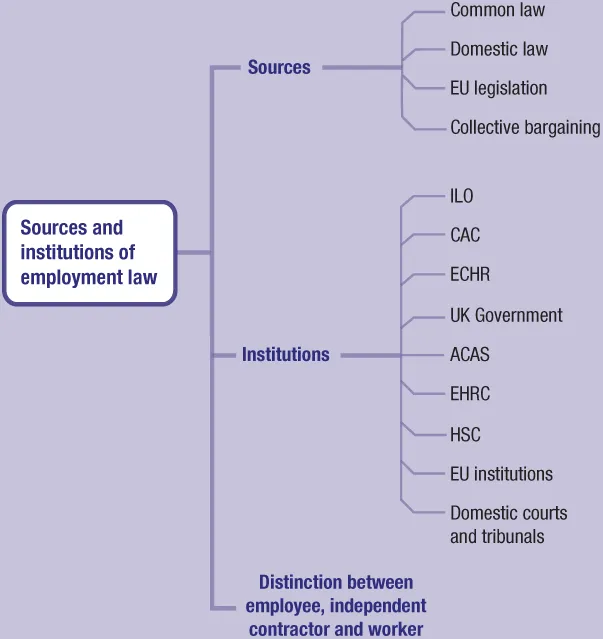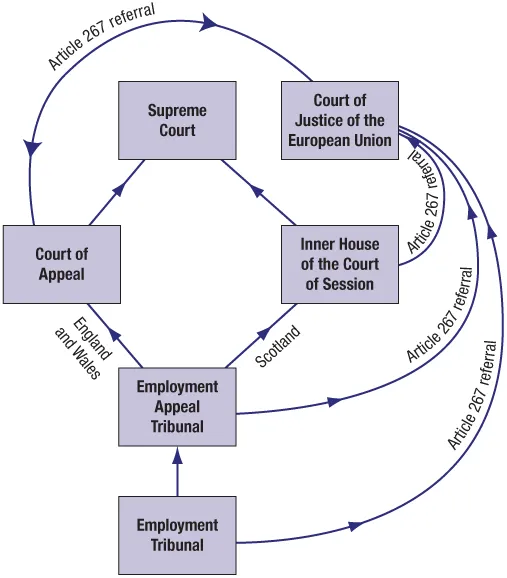
eBook - ePub
Ya no está disponible
Law Express: Employment Law
David Cabrelli
Este libro no está en la biblioteca ahora mismo. Busca otro.
Compartir libro
- 232 páginas
- English
- ePUB (apto para móviles)
- Disponible en iOS y Android
eBook - ePub
Ya no está disponible
Law Express: Employment Law
David Cabrelli
Detalles del libro
Vista previa del libro
Índice
Citas
Información del libro
Revise with the help of the UK’s bestselling law revision series.
· Review essential cases, statutes, and legal terms before exams.
· Assess and approach the subject by using expert advice.
· Gain higher marks with tips for advanced thinking and further discussions.
· Avoid common pitfalls with Don’t be tempted to.
· Practice answering sample questions and discover additional resources on the Companion website.
Preguntas frecuentes
¿Cómo cancelo mi suscripción?
¿Cómo descargo los libros?
Por el momento, todos nuestros libros ePub adaptables a dispositivos móviles se pueden descargar a través de la aplicación. La mayor parte de nuestros PDF también se puede descargar y ya estamos trabajando para que el resto también sea descargable. Obtén más información aquí.
¿En qué se diferencian los planes de precios?
Ambos planes te permiten acceder por completo a la biblioteca y a todas las funciones de Perlego. Las únicas diferencias son el precio y el período de suscripción: con el plan anual ahorrarás en torno a un 30 % en comparación con 12 meses de un plan mensual.
¿Qué es Perlego?
Somos un servicio de suscripción de libros de texto en línea que te permite acceder a toda una biblioteca en línea por menos de lo que cuesta un libro al mes. Con más de un millón de libros sobre más de 1000 categorías, ¡tenemos todo lo que necesitas! Obtén más información aquí.
¿Perlego ofrece la función de texto a voz?
Busca el símbolo de lectura en voz alta en tu próximo libro para ver si puedes escucharlo. La herramienta de lectura en voz alta lee el texto en voz alta por ti, resaltando el texto a medida que se lee. Puedes pausarla, acelerarla y ralentizarla. Obtén más información aquí.
¿Es Law Express: Employment Law un PDF/ePUB en línea?
Sí, puedes acceder a Law Express: Employment Law de David Cabrelli en formato PDF o ePUB. Tenemos más de un millón de libros disponibles en nuestro catálogo para que explores.
Chapter 1
The sources and institutions of employment law and key definitions
Revision checklist
Essential points you should know:
- The sources of employment law
- The institutions of employment law
- Distinction between an ‘employee’ and an ‘independent contractor’
- An understanding of the ‘worker’ and ‘contract personally to do work’ categories
- Relationship between each of the categories
Topic map

A printable version of this topic map is available from www.pearsoned.co.uk/lawexpress
Introduction
Employment law has a number of sources and specific institutions and employment rights are available to employees, ‘workers’ and independent contractors who have entered into a ‘contract personally to do work’.
Exam questions that ask students to determine whether an individual is an employee or an independent contractor are common and so this chapter will equip you with the tools to answer such a question confidently. There are three sections to this chapter:
- the sources of employment law;
- the institutions of employment law;
- an analysis of the concepts of ‘employee’, ‘worker’ and independent contractors who have entered into contracts ‘personally to do work’.
ASSESSMENT ADVICE
Essay questions
In connection with the sources and institutions of employment law, essay questions require broad general knowledge of those sources and institutions and their effect on the development of employment law and the enforcement of employment rights. You will also be expected to explain how legislation and the common law define the key concepts of ‘employee’, ‘worker’ and the ‘contract personally to do work’. An understanding of key cases in respect of each of these concepts is required. You must also exhibit knowledge of the employment rights enjoyed by ‘employees’, ‘workers’ and certain categories of self-employed persons. In tackling essay questions, you should always directly answer the question(s) asked and apply the relevant law.
Problem questions
Concentrating on the sources and institutions of employment law, problem questions may be framed in such a way that you are asked to advise employees regarding the source of the rights available to them (e.g. rights based on domestic legislation, rights enshrined in domestic legislation which are based on EU law, rights having EU law directly as their source) and the competing prospects of success in raising a claim based on these sources in an employment tribunal or a legal action in the courts. Most problem questions on the concepts of ‘employee’ and ‘worker’ will involve an examination of a person’s relationship with an enterprise and whether that person amounts to an ‘employee’ working under a contract of employment, a ‘worker’ or an independent contractor who has entered into a ‘contract personally to do work’. In answering problem questions, you will need to discuss the relevant statutory definitions and common law tests which distinguish between these categories. This may also be combined with other areas of employment law (e.g. if the person is a ‘worker’, what employment rights do they enjoy?). In tackling problem questions, you should always directly answer the question(s) asked and apply the relevant law to the facts at hand.
Sample question
Could you answer this question? Below is a typical essay question that could arise on this topic. Guidelines on answering the question are included at the end of the chapter, while a sample problem question and guidance on tackling it can be found on the companion website.
ESSAY QUESTION
Analyse how the law distinguishes between persons working under a contract of service and independent contractors. What is the legal significance of this distinction and is the law in need of reform?
Sources of employment law
With the exception of Chapter 11, this revision guide is concerned with the individual rights of employees, workers and independent contractors who have entered into contracts ‘personally to do work’ – which are directly enforceable against employers. The sources of employment law and employment rights are diverse. The topic map outlines the key (but not all) sources of individual employment law. One of the most important sources is EU law. EU law provides employees, workers and certain self-employed persons/independent contractors with employment rights directly enforceable in the UK courts and tribunals via the Treaty on the Functioning of the European Union, EU regulations and the decisions of the Court of Justice of the European Union. EU Directives provide employment rights directly in the national courts when domestic legislation implementing the terms of a Directive has come into force. Of course, Brexit will remove EU law as a source of domestic employment laws, but the current shape of the UK’s withdrawal from the EU is currently unclear and much will depend on the product of negotiations with the EU institutions. For that reason, EU law is covered in this work.
Institutions of employment law
There are a number of distinctive institutions of employment law. Some are designed to enforce employment rights and resolve employment disputes, such as the domestic courts, Employment Tribunals, the Employment Appeal Tribunal, the Central Arbitration Committee (CAC), the European Court of Human Rights (ECtHR) and the Court of Justice of the European Union. Others are intended to act as institutions that prevent such disputes arising in the first place, such as the Advisory, Conciliation and Arbitration Service (ACAS) and the Equality and Human Rights Commission (EHRC). Some act as standard-setters, such as the International Labour Organization (ILO) and ACAS (Codes of Practice), while others act as rule-makers, such as the European Parliament, the Council of the European Union and the UK Government. (See the topic map.)
Employment tribunals and the Employment Appeal Tribunal
Specific mention must be made of the Employment Tribunals (ETs) and the Employment Appeal Tribunal (EAT). ETs are specialist tribunals comprising one qualified lawyer and two laypersons. One layperson is selected after consultation with employers’ organisations. The other layperson is appointed after consultation with trade unions. The ETs are tribunals and are designed to be informal and cheaper for the public to use than domestic courts. ETs resolve disputes about employment rights which have legislation as their source. However, there are limited rights to raise employment claims before the ET where the dispute has the common law as its source. The constitutional basis and procedures of ETs are contained within the Employment Tribunals (Constitution and Rules of Procedure) Regulations 2013. Meanwhile, the EAT is composed of divisions with hearings taking place in London or Edinburgh. The EAT is staffed with judges of the High Court in England or Senators of the College of Justice in the Court of Session in Scotland. Such judges or Senators must have experience or an understanding of employment law and employment relations. The EAT hears appeals from the ETs on points of employment law, inter alia. See Figure 1.1 for a flowchart of the channel of appeals and how an Article 267 referral for a preliminary ruling may be made to the Court of Justice of the European Union (CJEU, formerly the European Court of Justice, ECJ).
Figure 1.1

Distinction between an ‘employee’, ‘worker’ and ‘independent contractor’
‘Employees’ are entitled to the full suite of co...